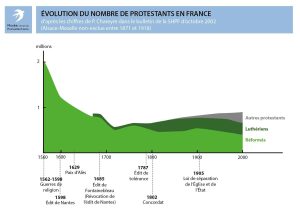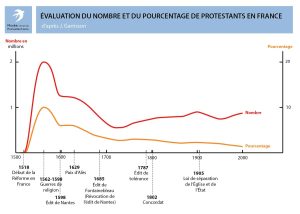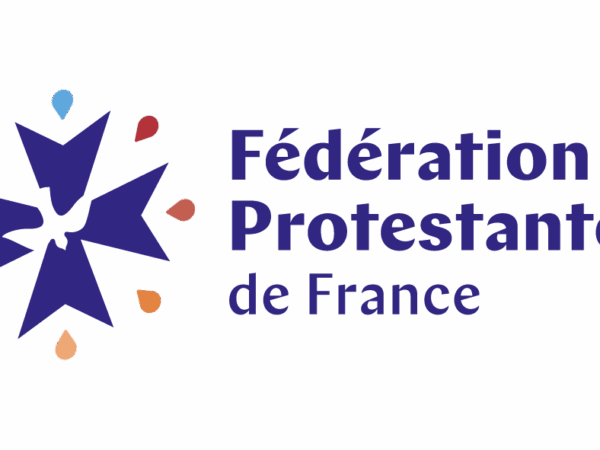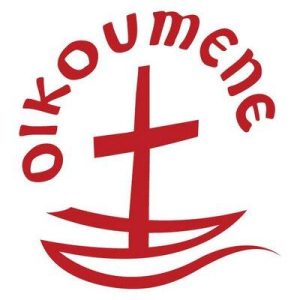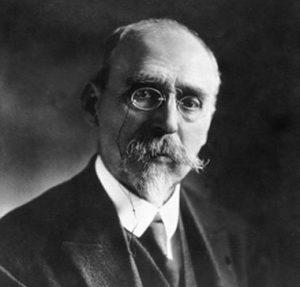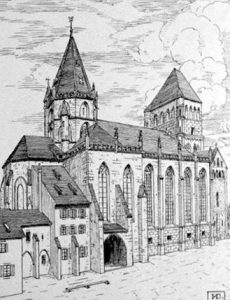The French Protestant Federation was created in 1905. It gathers together:
- about thirty Union of Churches representing all Protestant sensibilities, Reformed, Lutheran, Evangelical, Pentecostal, Adventist, more than 1,400 parishes and 1,600 pastors (women and men).
- over 80 Associations, gathering 500 institutions, Charities and Movements involved in different fields, either medico-social, assistance, youth or culture, etc.
The FPF is the representative Protestant body for the public authorities. The FPF Council comprises 25 members, and meets 4 times a year.
Almost 2 million people call themselves Protestant, i.e. about 3% of the French population. In France most Protestants belong to the French Protestant Federation.
Of the 2.2 billion Christians in the world, 800 million are Protestant.
Unity and diversity
In spite of being closely linked, all member Churches and associations maintain their freedom, their specificity and their identity, in the theological and practical fields. Churches maintain their own religious affiliation and the church principles they are attached to. For instance they do not share the same baptism pratices, nor have the same ecclesial organisation. Unity does not mean the absence of diversity, nor of differences.
All member Churches and associations, however, adhere to a number of convictions expressed in the Federation Charter. The aim is to bear witness to the Gospel, to acknowledge salvation by grace as fundamental, and to unreservedly accept one another for the Lord’s Supper.
Far from being considered a handicap or an abnormality to be eliminated, the extreme diversity is taken as a wealth to be experienced and shared.
The French Protestant Federation is a community of 900,000 people and continues to register membership applications, by Churches as well as associations.
History
Two factors were capital in the creation of the French Protestant Federation. First was the division inside French Protestantism at the turn of the century. It was felt by many to be harmful to the Gospel and had to be addressed. The second factor was the separation of the Churches and State. The French Protestants realised that not being able to make a contribution to the debate they needed an organisation in order to negotiate with the government.
From 1904 to 1905 the synodes of five Churches voted the creation of the French Protestant Federation (Methodist, Free Reformed, Reformed, Augsburg Confession and the Free Churches). The principles were adopted on the 25th of October 1905. The first Federation Council met in 1907. Two years later the first General Assembly was held in Nimes.
Many other Churches have since joined the Federation: the Baptist Church in 1916, the Apostolic Church in1972 and the Gypsy Church in 1976. The Pentecostal dimension further increased with the addition of the Church of God and the Union of Revival Churches in 1983. In 1985 the Salvation Army (now a Church body) joined.
In 1996 the Union of Evangelical Churches, that was a founder member but left during the 1960’s rejoined. In 2001 the Church of the Nazarene entered. In 2003 the Community of African Churches joined, and in 2006 five Evangelical, Pentecostal and Charismatic Churches became members: the Union of Protestant Assemblies in mission, the Union of the Federation of Adventist Churches and the Communion of Churches in the French Territory.
Since 1962, in addition to its Church members, the Federation also has charity, institutional and association members such as the CIMADE, Protestant Diaconal Mouvement, Scout mouvements, etc.
Members to the French Protestant Federation
The members are on the one hand the Church bodies and on the other charity and other organisations.
Membres de la Fédération protestante de France
Sont membres de la Fédération protestante de France, d’une part des unions d’Églises, d’autre part des œuvres et mouvements.


